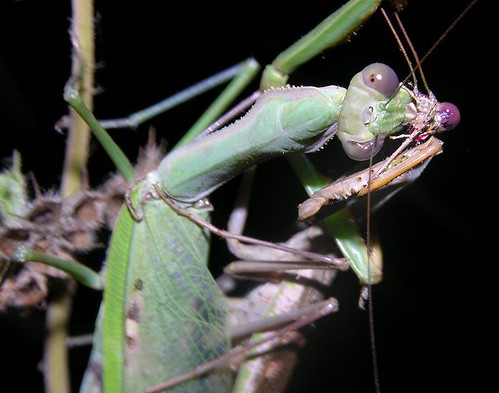Dinner Mate?
The ultimate urge - to reproduce and pass on our genes. For some however, it is a fatal desire?
Here a female Polyspilota sp. mantis from Madagascar is chewing off the head of a male while mating with him.
So from some of the experts in the crowd...
What evolutionary advantage is there in the death of the male?
Less resource competition (mating and future competition with the young for food)?
Elimination of a potential predator of the young?
(Thanks to artour_a at flickr for the excellent photo!)




















I think that the urge to feed on anything that moves and dies in your claws wins out over everything, especially when the male has evolved the mechanism to continue mating after the removal of your own head...
ReplyDeleteThere doesn't need to be an evolutionary advantage - there's just no evolutionary cost. The male has passed on his genome, and what happens to him next is irrelevant. Perhaps, however, in lean times, the extra source of food could make the offspring more successful, making the letting-your-head-get-chewed-off phenotype a success.
ReplyDeleteTo summarize miriam's comment, a cue might be in your title: "Dinner." :) Remember that males and females are in competition -- in general males invest significantly fewer resources in mating and particularly reproduction than do females, so a female's dinner may be more selectively advantageous for her than keeping his head is disadvantageous for him.
ReplyDeleteAs noted, this is an adaptationist tale, and is purely speculative.
Also, there is a big difference between what happens in captivity between two large predators, and what happens in the wild.
ReplyDeleteThe early papers that popularized the idea of cannibalism were pretty biased toward small containers. More recent field studies (which I, of course, can't put my hands on) found it to be fairly rare, although in one species there was a size relationship. Little males get munched.
Which could also just be opportunity, rather than adaptation.